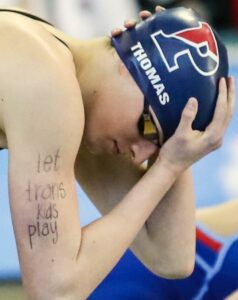CELEBRITY
NCAA: Lia Thomas has lost all her medals, Riley Gaines will get them all thanks to outside forces…see more

Transgender swimmer Lia Thomas’ hopes of competing in the Olympics have been slashed after she lost a legal battle challenging an effective ban on trans women competing in the highest levels of women’s swimming.
The sportswoman was attempting to overturn the ban introduced in 2022 that prohibited anyone who has undergone “any part of male puberty” from competing in the female category of elite races.

Highlights
Lia Thomas’ Olympic hopes were dashed after losing a legal battle against a ban on trans women in top-tier women’s swimmingThe Court of Arbitration for Sport dismissed Lia Thomas’ request to overturn the 2022 ban on trans women who have undergone male puberty from women’s elite racesThe athlete made history as the first transgender woman to win an NCAA Division I national championship in 2022.
However, on Wednesday, three judges on the Court of Arbitration for Sport (CAS) dismissed the 25-year-old swimmer’s request.

Transgender swimmer Lia Thomas lost a legal battle on Wednesday challenging a ban on trans women competing in the highest levels of women’s swimming
The athlete from Austin, Texas, made headlines a couple of years back when she was a member of the University of Pennsylvania women’s swimming team. She made history by becoming the first transgender athlete to win an NCAA Division I national championship, claiming victory in the 500-yard freestyle at the 2022 NCAA Women’s Swimming and Diving Championships.
Her victory sparked widespread debate and media coverage regarding transgender athletes’ inclusion in sports, and it was seen by some as a significant milestone for transgender rights and inclusion while others raised concerns about competitive equity in women’s sports.
The swimmer made history in 2022, becoming the first transgender woman to win an NCAA swimming championship
The same year she enjoyed success in women’s collegiate swimming, the World Aquatics (WA) banned transgender women who have been through male puberty from competing in women’s races.
Lia maintained that those rules were not only “invalid and unlawful” but also contrary to the Olympic charter and the World Aquatics constitution.
“Trans people don’t transition for athletics,” she said in an interview that aired on Good Morning America in 2022. “We transition to be happy and authentic and our true selves. Transitioning to get an advantage is not something that ever factors into our decisions.”
“It’s been a goal of mine to swim at Olympic trials for a very long time, and I would love to see that through,” she said in 2022
She revealed in the interview that she fell in love with swimming when she was four years old. The feeling of being disconnected from her body eventually came about as she grew older.
“I didn’t feel like I was a boy,” she said.
“When I was a young kid, my mom always would describe me as a very happy kid,” she continued. “And then sort of in middle school and high school, as I, like, went through puberty, that shifted a little bit, with gender dysphoria from being trans, but I didn’t have, I didn’t yet know or have the language to describe that.”
After graduating in 2022, the sportswomen kept a firm eye on the Olympics and hoped to reach the 2024 U.S. Olympic Team Trials.
“I intend to keep swimming,” she told the outlet. “It’s been a goal of mine to swim at Olympic trials for a very long time, and I would love to see that through.”











